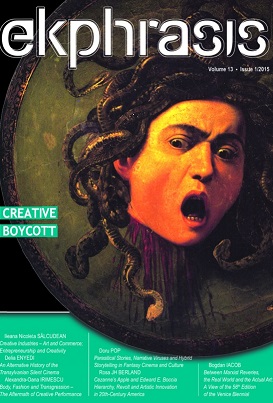Truth and Authenticity in Cinematography. Robert Bresson and the Cinematic Realism
Truth and Authenticity in Cinematography. Robert Bresson and the Cinematic Realism
Author(s): Raluca NESTOR OANCEASubject(s): Theatre, Dance, Performing Arts
Published by: Universitatea Babeş-Bolyai, Facultatea de Teatru si Televiziune
Keywords: cinematic realism; Robert Bresson; beauty; truth; authenticity
Summary/Abstract: The search for truth has been the task of philosophers for a long time. The artist has been banished from Plato’s ideal city, precisely because of his/her passion for phantasia, for the illusion the masses always adore. It was believed that the appearance itself has no value in the absence of the universal, transcendental truth. Later, in the romantic period, Wagner’s attempt to transform music into drama, the importance conferred by the composer to appearance, passion and to the acting itself was strongly incriminated by Nietzsche. Nowadays, our consumerist society is viewed by theorists like Guy Debord or Jean Baudrillard as a society of spectacle or as a space invaded by simulacra. They believe that the representation detached from any reality conquers the world, conducts lives and destinies, isolates people, transforms the individual into a trivial copy of a star specialized in apparent living. The artists react: modern playwright Berthold Brecht dissociates his epic theatre from emotional manipulation, film directors like Robert Bresson, and the members of the Nouvelle Vague or Dogma 95 plead against convention and theatricality. In this uncertain context, how can we define the art of Cinematography?1 Is it a component of the society of spectacle or a version of Plato’s cave? Can it be dissociated from the appearance, can it be redefined as a quest for the truth? On the other hand, is this technical image able to cope with traditional aesthetic categories like beauty or contemplation? All these questions will be discussed in the context of Robert Bresson’s films and writings. A series of connections with other auteurs and groups related to cinematic realism will also be made. The meaning of image, music and actor’s performance along with the differences between cinema and theatre or painting will be questioned with the goal to distinguish between what can be considered false and what can be considered truth in film. With the help of key texts written by Walter Benjamin, Susan Sontag and André Bazin and by employing a number of paradigmatic theories of beauty and truth2 this paper will search for an inner connection of cinematic realism with categories such as beauty, truth, and authenticity.
Journal: Ekphrasis. Images, Cinema, Theory, Media
- Issue Year: 13/2015
- Issue No: 1
- Page Range: 142-159
- Page Count: 18

